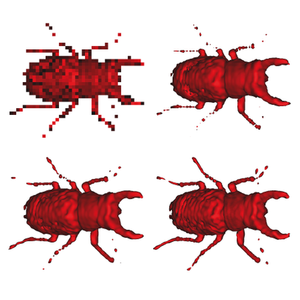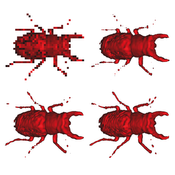Information
- Publication Type: Conference Paper
- Workgroup(s)/Project(s):
- Date: May 2006
- Publisher: IEEE CS
- Lecturer: Peter Rautek
- Booktitle: Proceedings of Eurographics / IEEE VGTC Symposium on Visualization
- Number: In Proceedings of EuroVis
- Pages: 211 – 218
- Keywords: Volume Rendering, Filtered Back-Projection, Reconstruction
Abstract
Volume rendering techniques are conventionally classified as either direct or indirect methods. Indirect methods require to transform the initial volumetric model into an intermediate geometrical model in order to efficiently visualize it. In contrast, direct volume rendering (DVR) methods can directly process the volumetric data. Modern CT scanners usually provide data as a set of samples on a rectilinear grid, which is computed from the measured projections by discrete tomographic reconstruction. Therefore the rectilinear grid can already be considered as an intermediate volume representation. In this paper we introduce direct direct volume rendering (D²VR). D²VR does not require a rectilinear grid, since it is based on an immediate processing of the measured projections. Arbitrary samples for ray casting are reconstructed from the projections by using the Filtered Back-Projection algorithm. Our method removes a lossy resampling step from the classical volume rendering pipeline. It provides much higher accuracy than traditional grid-based resampling techniques do. Furthermore we also present a novel high-quality gradient estimation scheme, which is also based on the Filtered Back-Projection algorithm.Additional Files and Images
Weblinks
No further information available.BibTeX
@inproceedings{RAUTEK06,
title = "D²VR: High Quality Volume Rendering of Projection-based
Volumetric Data",
author = "Peter Rautek and Bal\'{a}zs Cs\'{e}bfalvi and S\"{o}ren
Grimm and Stefan Bruckner and Eduard Gr\"{o}ller",
year = "2006",
abstract = "Volume rendering techniques are conventionally classified as
either direct or indirect methods. Indirect methods require
to transform the initial volumetric model into an
intermediate geometrical model in order to efficiently
visualize it. In contrast, direct volume rendering (DVR)
methods can directly process the volumetric data. Modern CT
scanners usually provide data as a set of samples on a
rectilinear grid, which is computed from the measured
projections by discrete tomographic reconstruction.
Therefore the rectilinear grid can already be considered as
an intermediate volume representation. In this paper we
introduce direct direct volume rendering (D²VR). D²VR does
not require a rectilinear grid, since it is based on an
immediate processing of the measured projections. Arbitrary
samples for ray casting are reconstructed from the
projections by using the Filtered Back-Projection algorithm.
Our method removes a lossy resampling step from the
classical volume rendering pipeline. It provides much higher
accuracy than traditional grid-based resampling techniques
do. Furthermore we also present a novel high-quality
gradient estimation scheme, which is also based on the
Filtered Back-Projection algorithm.",
month = may,
publisher = "IEEE CS",
booktitle = "Proceedings of Eurographics / IEEE VGTC Symposium on
Visualization",
number = "In Proceedings of EuroVis",
pages = "211--218",
keywords = "Volume Rendering, Filtered Back-Projection, Reconstruction",
URL = "https://www.cg.tuwien.ac.at/research/publications/2006/RAUTEK06/",
}


 paper
paper
